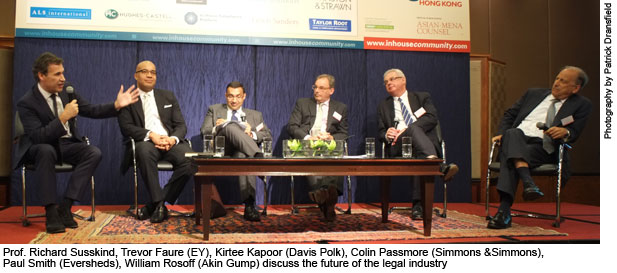 As Richard Susskind, Trevor Faure, Kirtee Kapoor, Colin Passmore, Paul Smith and William Rosoff took the stage on October 8th at the sixteenth annual Hong Kong In-House Congress to help their audience of external and in-house counsel understand their views on the future of law, few knew a passionate debate was about to commence. As was explained, recent economic events and technological updates leave the modern day lawyer in a fight or flight situation. After the economic crash, law budgets were much more in focus, forcing in-house departments to find alternative, more creative methods of coverage. True, the worst does seem to be behind us, but the last thing in-house counsel will want to do is return to old, expensive habits, particularly having found that their new cost-effective methods, having had some time to teethe, do work. These, as pointed out during the plenary, inlclude online legal services and, as was advocated by keynote speaker Hong Kong Secretary for Justice Mr Rimsky Yuen, SC, arbitration. The knowledge and time that were once so prized and expensive can now be accessed cheaply and quickened, respectively. But, as Richard Susskind pointed out, the future doesn’t have to be bleak for lawyers. If there are commoditised tasks that can be accomplished more cheaply and efficiently by technology, both in-house and external lawyers have to master what can’t be done by a machine: what Trevor Faure would refer to as the ‘cream’ of legal work. Put another way, if the goal posts move, you have to adjust your aim. The question asked by Richard Susskind, which incited a heated debate was “To what problems are in-house counsel the solution?”. This then led to the subsequent and perhaps more pertinent question ‘If in-house lawyers solve some problems and technology others, what does that leave for external counsel?’. As each presenter defended their own side, it was clear that time was going to run out before any sort of a conclusion was reached. Seemingly, the only thing that could be agreed upon was that in the future, those with legal empires would have to adjust or fall. As Bob Dylan said “Eden is burning, either brace yourself for elimination / Or else your hearts must have the courage for the changing of the guards”. The 16th Hong Kong Congress truly began in interesting form, and we’d like to thank Akin Gump, Clyde & Co, Davis Polk, Debevoise & Plimpton LLP, Eversheds, the Hong Kong International Arbitration Centre, Mintz Group, Simmons & Simmons and Winston & Strawn for co-hosting, as well as ALS International, Hughes-Castell, Lewis Sanders and Taylor Root for their sponsorship. We’re very grateful to all for their help in the congregation of 347 delegates to this annual event. After the Congress, Richard Susskind, Kirtee Kapoor and Trevor Faure travelled to Macau to present at our inaugural Executive Lawyers’ Thought Forum. Co-hosted by Davis Polk and Ernst & Young, the Executive Lawyers’ Thought Forum was the first of its kind – a very special gathering of twenty-five General Counsel of top-tier investment banks, billion dollar plus companies and hand-picked managing partners of award-winning law firms. |
The future of the legal industry: discussion with Richard Susskind, Trevor Faure etc.
44
previous post

